Warrant for Soldier’s Pay from John Dickinson for John Barber
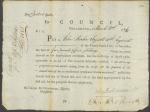



President of Pennsylvania John Dickinson signs this warrant to pay Captain James Gibbons, of the Pennsylvania Line, for his service as a soldier during the Revolutionary War.

President of Pennsylvania John Dickinson signs this warrant to pay Captain Alexander Parker, of the Pennsylvania Line, for his service as a soldier during the Revolutionary War.

President of Pennsylvania John Dickinson signs this warrant to pay Captain James Chrystie, of the Pennsylvania Line, for his service as a soldier during the Revolutionary War.


President of Pennsylvania John Dickinson signs this warrant to pay James Butler, a Corporal in the Eleventh Regiment of the Pennsylvania Line, for his service as a soldier during the Revolutionary War.
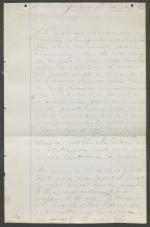
Frank G. Graham prepared this oration, entitled “John Dickinson," for the commencement ceremonies held June 28, 1883. Authoring an original speech was among the graduation requirements for Dickinson College seniors at that time.
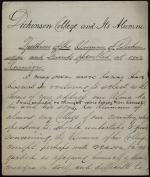
A speech about the history of Dickinson College written by an anonymous author for a reunion of Dickinson alumni in 1866. Transcript included.

An anonymous author writes this essay on the history of Dickinson College, which is published in The Port Folio, vol. 5 (March 1811): 239-246. This essay is published with B.

Professor William Henry Allen delivers a speech, "Dickinson College: An Historical Sketch," about the first 90 years of the College's history to the Philadelphia Conference Historical Society.

Warrant for wages from John Dickinson for Frederick Sneider's service as door keeper. Transcript included.

President of Pennsylvania John Dickinson signs this warrant to pay John Hays for his service as a soldier during the Revolutionary War. David Rittenhouse, Esquire, is listed on the document as the treasurer.

John Culbertson receives this deed for 300 acres in Westmoreland County, Pennsylvania. John Dickinson, as President of the Supreme Executive Council, signs the deed on November 8, 1784.

John Dickinson writes to bookseller William Young, notifying him that one volume is missing from a set of history books "sent down by my neighbor Park." Transcript included.
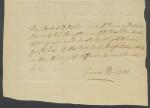
Pennsylvania Governor John Dickinson asks Elias Boudinot, the President of Congress, for copies of the last two dispatches. Transcript included.
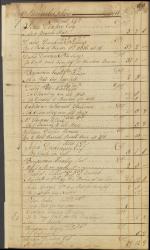
This page from an account book of a hatter based in Philadelphia includes purchases by John Dickinson, John Montgomery, and Stephen Duncan.
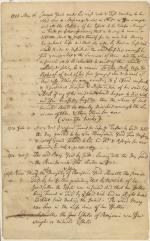
Attorney John Dickinson writes this legal opinion regarding Joseph Yard's will .

Attorney John Dickinson writes this legal opinion regarding George Churchman's case, which is centered on a disagreement over land. "I have concluded ... that Churchman's title to the Land in Dispute, is good in Law," as Dickinson notes.

John Dickinson writes George Washington to introduce and recommend the portrait painter, Robert Edge Pine.
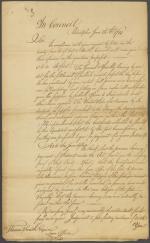
President of Pennsylvania John Dickinson writes to Thomas Smith, a loan officer, and explains settling the certificates that public officers used to pay for supplies, the payment of interest, and how to account for depreciation.
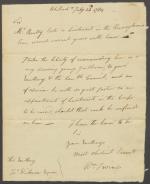
General William Irvine writes John Dickinson, the President of Pennsylvania, and recommends Erkurius Beatty's appointment as an officer.
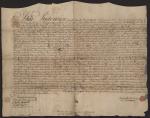
John Dickinson sells the tract of land, "Brothers Portion," near Dove, Kent County in Delaware to William Killen on August 12, 1766. Dickinson signs the deed with his personal seal and Caesar Rodney signs it as the Recorder.

Philadelphia attorney John Dickinson sends this bill of exchange for 100 pounds to pay John Hanbury Osgood, who is in London.
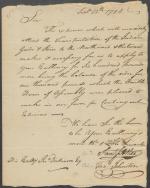
Pennsylvania politician Samuel John Atlee and Colonel Francis Johnston write to Pennsylvania Governor John Dickinson and request the balance of funds that the "House of Assembly were pleased to make" for "the transportation of the Indian goods an
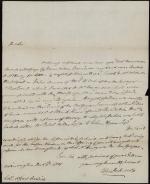
John Dickinson writes Robert Magaw and asks him to conduct a "strict Enquiry" into "a [mortgage] by James Wilson Esquire on my Land near Carlisle." Transcript included.